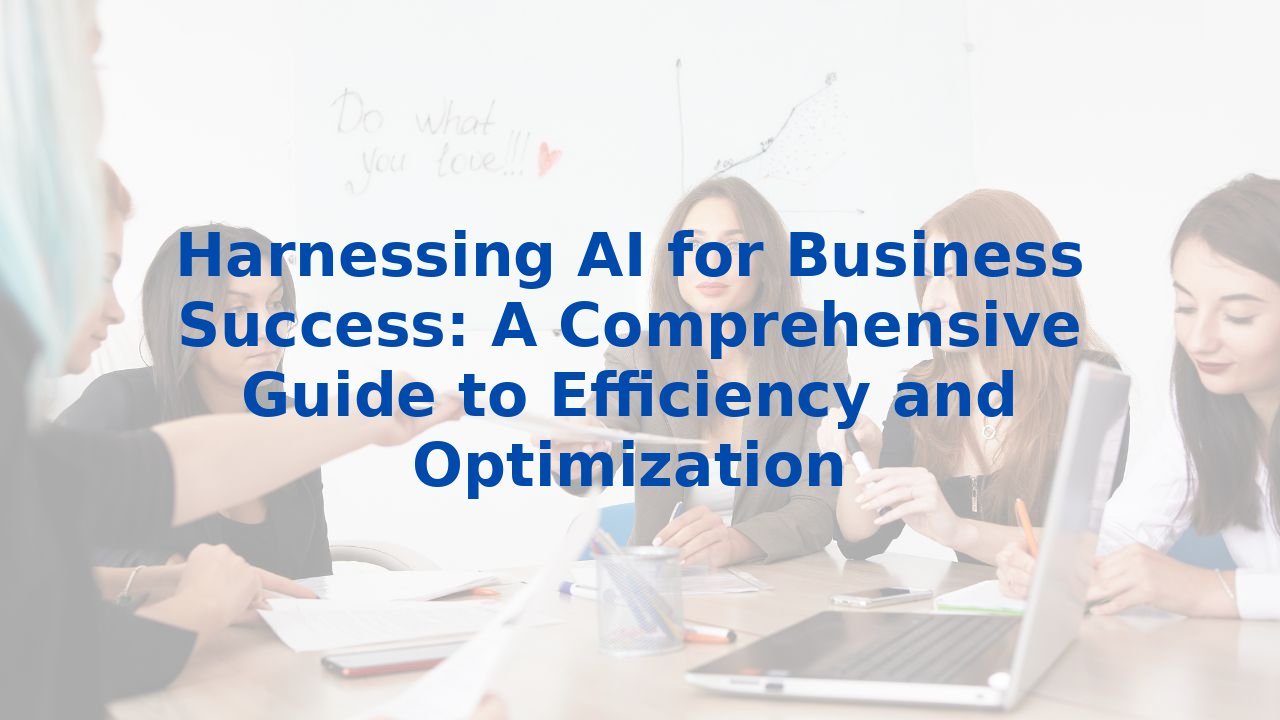Harnessing AI for Business Success: A Comprehensive Guide to Efficiency and Optimization
Harnessing AI for Business Success: A Comprehensive Guide to Efficiency and Optimization
Introduction
In the ever-evolving landscape of modern business, organizations are continually seeking innovative ways to enhance efficiency and optimize their processes. One of the most significant advancements in this realm is the emergence of Artificial Intelligence (AI). This transformative technology not only streamlines activities but also fosters a culture of innovation and strategic thinking. In this guide, we will explore how AI can redefine business operations, improve efficiency, and what your organization might gain from investing in AI training for your team.
1. Automating Routine Tasks
At the heart of enhancing business efficiency lies the automation of routine tasks. AI technologies can take over mundane activities, such as document processing and data entry, allowing employees to divert their focus towards more strategic functions. For example, intelligent document processing (IDP) leverages AI to effortlessly convert documents into usable data with minimal human intervention. Additionally, AI-powered chatbots can manage simple customer inquiries, unburdening your human resources to tackle more complex issues that require a personal touch.
2. Improving Decision Making
AI significantly enhances the decision-making process by diving deep into data analytics. When faced with massive amounts of information, AI can identify patterns and trends that humans may overlook. This capability enables business leaders to simulate various scenarios within their operations. For instance, predictive analytics can empower analysts to gauge the implications of price adjustments on overall profitability, leading to more informed pricing strategies that balance customer satisfaction with financial objectives.
3. Enhancing Customer Service
The role of AI in customer service has been revolutionary. By parsing customer feedback and requests through powerful analytics, organizations can elevate their customer experience to new heights. AI can categorize and prioritize incoming customer inquiries, ensuring that urgent matters receive immediate attention, while routine tasks are handled with efficiency. Moreover, AI-driven tools can monitor the quality of customer service interactions, identifying strengths and areas for improvement, which translates to superior service delivery.
4. Optimizing Product Development Processes
AI also plays a crucial role in enhancing product development. By utilizing generative design software, AI can explore a multitude of design avenues that meet preset criteria, minimizing time and resources wasted on non-viable prototypes. This leads to faster, more innovative product development and a more robust product offering that aligns with market demand.
5. Automating Content Generation
The ability of AI to generate content has opened new doors for businesses looking to communicate more effectively and efficiently. Organizations can leverage AI to create everything from product descriptions to detailed reports at astonishing speeds, often producing thousands of lines of text in mere seconds. This automation frees up valuable human resources to focus on crafting more nuanced, creative content that resonates with audiences.
6. Enhancing HR Processes
Even in human resources, AI is making waves. Streamlining recruitment processes is paramount, and AI tools can take the lead by performing initial candidate assessments that expedite hiring timelines. Additionally, AI can analyze employee engagement and attrition patterns, helping organizations develop strategies that improve retention and overall employee satisfaction.
Benefits of AI for Business Processes
Integrating AI into business processes carries a multitude of benefits:
- Improved Efficiency: By automating repetitive tasks, AI minimizes errors, allowing employees to dedicate time to more strategic work.
- Enhanced Decision Making: Data-driven insights provided by AI empower leaders to make better-informed choices.
- Increased Productivity: The acceleration of data analysis and process automation introduces more impactful productivity levels.
- Better Customer Experience: Swift and accurate responses to customer inquiries enhance satisfaction.
- Continuous Improvement: Real-time feedback and data insights herald a culture of agility and innovation.
Training Employees for AI
While the capabilities of AI are immense, the true potential unlocks when employees are trained to utilize these tools effectively. Training programs focused on AI should emphasize:
- Understanding AI Tools: Employees need a foundational understanding of how AI operates and its integration in daily processes.
- Data Analysis Skills: Basic data comprehension fuels the ability to interpret AI-generated insights.
- Adaptability: Cultivating a mindset open to new technologies is vital for a smooth transition into AI-driven environments.
- Continuous Learning: Ongoing training ensures that employees remain abreast of evolving AI technologies and best practices.
Conclusion
Harnessing AI for business success isn’t just a trend; it’s a necessity for organizations seeking to thrive in a competitive landscape. By automating tasks, refining decision-making, and showcasing innovation in product development, AI acts as a catalyst for efficiency. Fostering a culture that embraces AI starts with training your workforce. The equation is simple: an organization that invests in AI and its people is one that is poised for success in the face of change.



